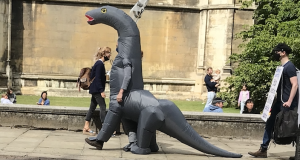
Notizie
Ricevimento / Office Hours (onsite at Marco Polo):
Please contact me via email and I will set up an appointment (either online or at Marco Polo)
1st year MLI: The Google Classroom code for materials is: ijlgbft
For the full 12 credits, you also need to complete the lettorato with Darragh Mulcahy.
3rd year MLI (Language):
For the full credits, you need to sit the lettorato 'text analysis' exam with Guido D'Elia.
3rd year MLI (Translation):
The Google Classroom code for materials is: 5ryyk3f
The 3rd year lettore for MLI is Dott. Guido D'Elia (guido.delia@uniroma1.it).
Magistrale Translation (EAAS): there is no lettorato linked to this course
The Google Classroom code for extra material is: fepoyv4.
HOW TO ACCESS COURSE DESCRIPTIONS:
Go to the 'insegnamenti' tab on this page and click on the module you wish to look up - this will send you to the degree course page - here you need to find the module you are looking for again and click on it - you will then see my page again where you need to click on the photo of the dinosaur. It's a little complicated: we're hoping the software will be fixed soon!
-----------------------------------------------------------------------------------
OPIS code for the questionnaires for 2024/25:
1st year MLI: WN46JC3D
3rd year MLI (Language): 0CI01LBK
3rd year MLI (Translation): T2D9Y4UR
Magistrale Translation (EAAS + SLLT): TERLMMM0
----------------------------------------------------------------------------------------
Verbalizzazione / Registration of exams:
The exam registration will take place remotely. Once you have signed up, you don't need to do anything else. For the date of exams, see above.
Exam sessions:
Please DO NOT sign up on Infostud.
Exam dates:
Thursday 16th January 2025
Wednesday 19th February 2025
Thursday 12th June 2025
Monday 14th July 2025 (the enrolment is now closed for this exam - you will be able to sit the exam in September)
Friday 12th September 2025 (instructions for signing up will appear here after the July session)
Friday 16th January 2026
Sessioni straordinarie:
Monday 7th April 2025
Wednesday 5th November 2025
----------------------------------------------------------------------------------------
Exam results:
EXAMS: (please note that I use Infostud only for registering marks - verbalizzazione - and NOT for signing up for the exams themselves)
If you already have your mark, please sign up on Infostud before midnight on Friday 18th July and I will register your mark remotely on Saturday 19th July.
For the marks that will come out by 24th July, I will open a new verbalizzazione date on Infostud. Check back here for updates.
1st yr English Language MLI:
Unless stated otherwise, all marks include the lettorato.
AA 2211854 28
AAC 2154814 18 no lek
AB 2212836 18 no lek
BB 2209274 26 no lek
NB 2178840 20
CC 2172429 20 no lek
FDE 2181170 24
EG 2179453 22 no lek
GG 2211034 26
DP 2208472 27 no lek
MS 2150703 27
SS 2208886 28
ET 2171766 25 no lek
3rd yr Translation MLI:
ATA 1896723 28
CB 2186311 (E) 24
MB 2079837 25
ADA 2087192 24
ADL 2083747 23
ML 2084814 30
BM 2082857 30 (no lek)
MCM 2048610 30+L
AP 1614950 28
OP 2082619 27
MP 1908076 24
ES 2086896 27
LS 2184266 (E) 30
DY 2224632 (E) 27
3rd yr Language and Gender MLI:
LA 1940597 30+ L
BC 2082059. 28
RF 2060330 27 no lek
LIG 2085093 28 no lek
ADI 2086070 26
MAT 2084149 30
LZ 2016617 25
Magistrale
YG 2101219 28
EL 1954158 29
XL 2167531 19
Older exams
1st year MLI: The following marks, when both papers have been done, give your final mark.
3rd year Language and Gender exams. The following marks, when both papers have been done, give your final mark.
CB 2186311 20 final mark
EG 1893411 Buono (lek)
ANM 2085105 27 (no lek)
CC 2081082 24 no lek
FI 2000647 25 no lek
AM 2085105 27 final mark
EO 1972603 24 no lek
AP 1614950 26
3rd year Translation exams. The following marks, when both papers have been done, give the ‘giudizio’ from the lettorato first, followed by your final mark.
AA 1949440 24 no lek
AB 1887283 final mark 27
Magistrale translation exam:
ADG 2153151 26
BF 1915586 26
BM 1973759 24
BEU 2184901 27
NA 2191470 24
MR 2186413 25
AS 2186404 23
ZT 2191027 22
SU 2220586 26
GY 2191219 below minimum mark
VQ 1945954 25
ADG 2153151 24
MP 1938293 23
